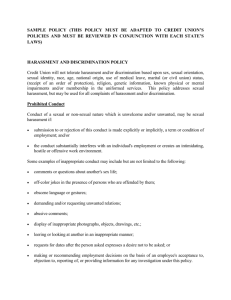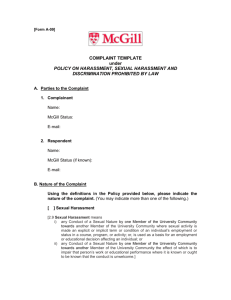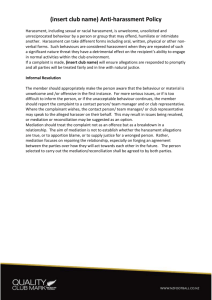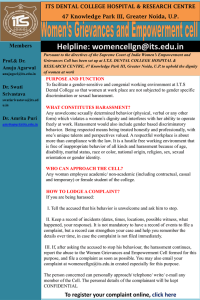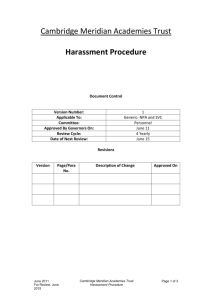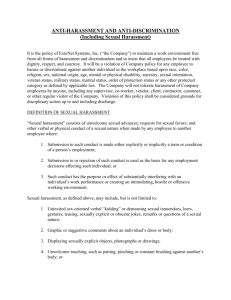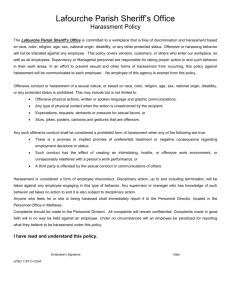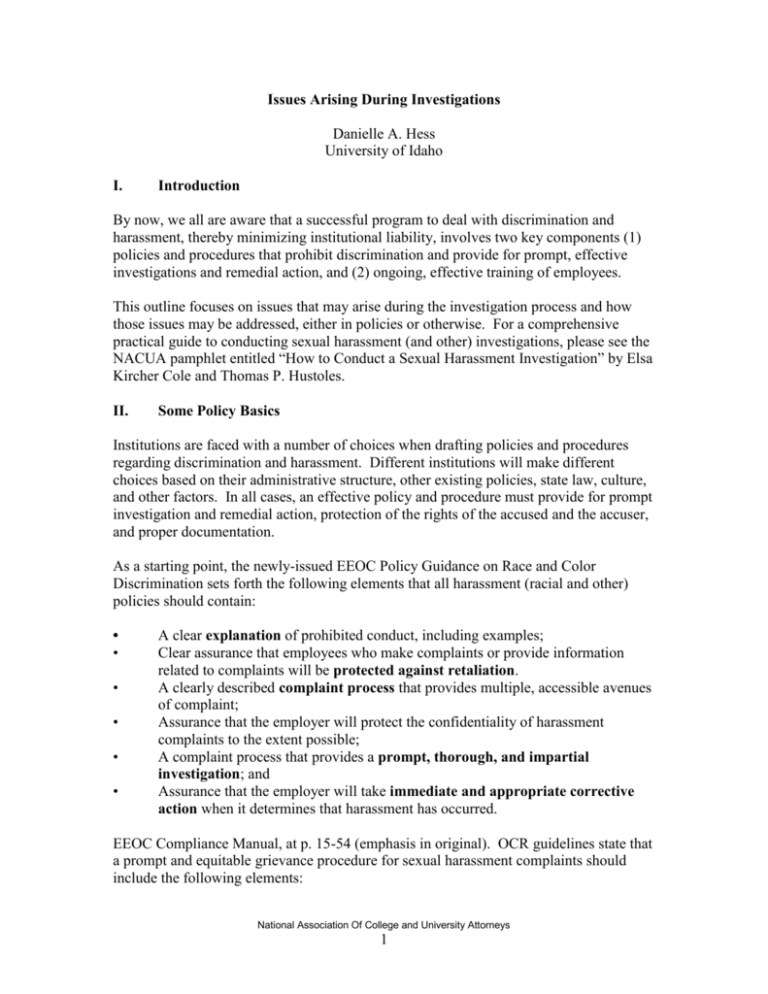
Issues Arising During Investigations
Danielle A. Hess
University of Idaho
I.
Introduction
By now, we all are aware that a successful program to deal with discrimination and
harassment, thereby minimizing institutional liability, involves two key components (1)
policies and procedures that prohibit discrimination and provide for prompt, effective
investigations and remedial action, and (2) ongoing, effective training of employees.
This outline focuses on issues that may arise during the investigation process and how
those issues may be addressed, either in policies or otherwise. For a comprehensive
practical guide to conducting sexual harassment (and other) investigations, please see the
NACUA pamphlet entitled “How to Conduct a Sexual Harassment Investigation” by Elsa
Kircher Cole and Thomas P. Hustoles.
II.
Some Policy Basics
Institutions are faced with a number of choices when drafting policies and procedures
regarding discrimination and harassment. Different institutions will make different
choices based on their administrative structure, other existing policies, state law, culture,
and other factors. In all cases, an effective policy and procedure must provide for prompt
investigation and remedial action, protection of the rights of the accused and the accuser,
and proper documentation.
As a starting point, the newly-issued EEOC Policy Guidance on Race and Color
Discrimination sets forth the following elements that all harassment (racial and other)
policies should contain:
•
•
•
•
•
•
A clear explanation of prohibited conduct, including examples;
Clear assurance that employees who make complaints or provide information
related to complaints will be protected against retaliation.
A clearly described complaint process that provides multiple, accessible avenues
of complaint;
Assurance that the employer will protect the confidentiality of harassment
complaints to the extent possible;
A complaint process that provides a prompt, thorough, and impartial
investigation; and
Assurance that the employer will take immediate and appropriate corrective
action when it determines that harassment has occurred.
EEOC Compliance Manual, at p. 15-54 (emphasis in original). OCR guidelines state that
a prompt and equitable grievance procedure for sexual harassment complaints should
include the following elements:
National Association Of College and University Attorneys
1
Notice to students, parents of elementary and secondary students, and employees
of the procedure, including where complaints may be filed;
Application of the procedure to complaints alleging harassment carried out by
employees, other students, or third parties;
Adequate, reliable, and impartial investigation of complaints, including the
opportunity to present witnesses and other evidence;
Designated and reasonably prompt timeframes for the major stages of the
complaint process;
Notice to the parties of the outcome of the complaint; and
An assurance that the school will take steps to prevent recurrence of any
harassment and to correct its discriminatory effects on the complainant and others,
if appropriate.
OCR, Revised Sexual Harassment Guidance: Harassment of Students by School
Employees, Other Students, or Third Parties (January 19, 2001).
Beyond these basics, however, there may be acceptable variations that institutions should
consider.
A.
Separate Policies for Students and Employees?
While it is not necessary to have separate harassment investigation policies for students
and employees, some institutions have chosen to do so. Accused students may be
governed by a statement of student rights that gives them different rights than employees
(for example, a right to an adviser or a right to refuse to provide evidence against himself
or herself). Employees also may have certain rights not available to students. In
addition, there may be different confidentiality requirements pertaining to students, either
because of FERPA, state law, or internal policies.
If your compliance officer normally deals with employees, not students, he or she may
not be completely familiar with the specific issues pertaining to students. On the other
hand, your dean of students (or equivalent) officer may not have a high level of expertise
in dealing with harassment and discrimination investigations. To combine expertise,
some policies provide for one office to take the lead in investigations involving student
respondents, in close consultation with the other.
B.
Separate Policy for Sexual Harassment?
Because of the overlap between harassment and discrimination claims, some institutions
have foregone having a separate sexual harassment policy and now combine all
harassment and discrimination policies and procedures. This approach provides a single
resource for investigators, complainants, and respondents. The policy should clearly state
what it covers and should clearly state that it covers sexual harassment. If there are
elements that apply specifically to one type of complaint, these still can be addressed
separately in the same policy.
National Association Of College and University Attorneys
2
If policies are combined, it is important not to short-change your harassment policies.
For example, the EEOC guidance recommends including examples of the types of
behavior that may constitute harassment. In addition, the harassment and discrimination
policy should cite and provide links to related policies, such as the institution’s nonfraternization policy.
C.
Should You Have a Process for Informal Resolution?
Many attorneys have come to hate informal attempts to resolve discrimination and
harassment complaints because, all too often, efforts at informal resolution turn into
claims that the institution “did nothing” in response to a complaint. Nonetheless, many
complainants are reluctant to make a formal complaint, and the absence of an informal
process could prevent some complaints from being brought forward. For these reasons,
many institutions continue to offer an informal process.
Informal procedures can be used without undue liability exposure only if the process
provides a prompt, effective remedy to the complainant, is fair to both the complainant
and the accused, and is well documented. In addition, an informal resolution process
should contain all the elements set forth in the EEOC and OCR policy guidance. Thus,
although the process may be viewed by the parties as “informal,” the institution must
handle it similarly to a formal complaint. An informal resolution process may not be
appropriate for complaints that involve serious misconduct (such as sexual assault), or
situations that are highly contentious.
III.
Miscellaneous Issues Arising During Investigations
Even with comprehensive anti-harassment policies and procedures, it is impossible (and
probably undesirable) for the policies to predict and deal with all the various challenges
that will be presented to your affirmative action officer. Below are a few common
“twists” that occur and some suggestions for dealing with them.
A.
Delayed Investigation or Resolution
Recent cases have highlighted the need for timely resolution of harassment complaints.
See, e.g., Williams v. Board of Regents of University System of Georgia, 441 F.3d 1287
(11th Cir., March 10, 2006) (in student-on-student harassment case under Title IX, eightmonth delay in holding disciplinary proceeding constituted evidence of deliberate
indifference).
For cases in which final resolution of a complaint is unavoidably delayed, effective
temporary actions that protect the complainant, along with communication with and
support of the complainant, may be helpful in limiting liability. In Oden v. Northern
Marianas College, 440 F.3d 1085 (9th Cir., March 6, 2006), a Title IX sexual harassment
case, the plaintiff argued that the college demonstrated deliberate indifference to her
sexual harassment complaint. The college’s policies required a hearing within 30 days of
filing the complaint; however, the hearing took place only after a nine-month delay. The
National Association Of College and University Attorneys
3
court held in favor of the college, stating there was no evidence that the delay prejudiced
the plaintiff. The court noted the following:
The College began to act as soon as it became aware of Plaintiff’s allegations.
Two counselors were assigned to Plaintiff to provide psychological and practical
support; they met with her more than a dozen times; they assisted her in filing a
formal complaint; and they helped her drop Dalla Pozza’s [the respondent’s] class
immediately. After the complaint was filed, the College served it on Dalla Pozza.
He was instructed not to have any contact with Plaintiff. Eventually a hearing
took place, Plaintiff was believed, and Dalla Pozza was significantly disciplined.
Thus, although the college’s formal action was delayed, its interim actions were sufficient
to demonstrate that it was not “deliberately indifferent” to the complaint.
B.
Pending Criminal Charges
In some cases, there may be a pending criminal charge associated with the harassment
complaint that is being investigated. The respondent may choose not to participate in the
harassment investigation and may claim the Fifth Amendment privilege against selfincrimination. Some employers have policies requiring employees to participate in
internal investigations, and employees may be disciplined for refusing to participate. For
public employers, however, terminating or threatening to terminate an employee who has
taken the Fifth may, in some situations, itself implicate the employee’s Fifth Amendment
rights. See Garrity v. New Jersey, 385 U.S. 493 (1967) (mental coercion to answer
questions constitutes compulsion for purposes of Fifth Amendment).1
One option is to wait until the criminal charges have been resolved. However, it is not
uncommon for criminal trials to be continued for periods of several months or more.
This delay may violate time parameters in the harassment policy, create an untenable
situation for the complainant, and ultimately create legal liability for the institution for
failure to investigate promptly. For example, in Williams vs. Board of Regents of
University System of Georgia, supra, the court rejected the University’s claim that the
delay of disciplinary proceedings was justified by a pending criminal trial arising from
the same facts. The court stated:
To the extent that UGA argues that it waited so long because of the pending
criminal trials against the assailants, this argument also fails because: (1) the
pending criminal charges did not affect UGA’s ability to institute its own
procedures; (2) the criminal charges were an ineffectual means to prevent future
attacks at UGA while the charges were pending; and (3) the disciplinary
proceedings were not instituted for another four months after Brandon Williams’s
acquittal and the dismissal of charges against Cole and Thomas.
441 F.3d, at 1299-1300.
Since Garrity, public employees’ rights under the Fifth Amendment have been discussed extensively in
numerous cases. This outline does not discuss these cases but merely raises the issue.
1
National Association Of College and University Attorneys
4
Rather than waiting for the criminal charges to be resolved, it may be preferable for the
institution to move forward immediately with its own investigation. The respondent
should be notified in writing that he or she has the opportunity to participate in the
investigation, that the institution has an obligation to move forward with the investigation
despite his or her refusal to participate, and that the investigator will gather all the
evidence available and make a determination based on that evidence. Then the
institution’s established investigation procedures should be followed to the extent
possible, giving the respondent every opportunity to participate and to provide
information, including names of witnesses, and documenting the respondent’s refusal to
do so and any deviations in the normal procedure that are necessitated by this refusal. If
the ultimate determination, based on the available evidence, is that the harassment
occurred, the respondent should be advised of the opportunity to appeal, and normal
appeal and follow-up disciplinary procedures should be followed.
C.
Accused Files a Complaint Against the Investigator
Instead of appealing a harassment determination, periodically a respondent who has been
found to have committed harassment will file a separate complaint of his or her own,
alleging that the investigator discriminated on the basis of race or some other protected
characteristic, or that the investigation violated due process. The institution is
particularly vulnerable to these types of complaints when the investigator/affirmative
action officer fails to carefully follow the institution’s policies and procedures.
Some institutions may have an individual officer or oversight committee designated in
their policies for dealing with these types of complaints. Others hire an external, third
party investigator to evaluate complaints against their internal investigators. Regardless
of the mechanism, it is important to handle these complaints consistently, promptly, and
effectively. The “investigator’s investigator” should review the complaint, review all the
relevant evidence, issue a written report, and follow any institutional procedures that
apply to these reviews.
The tendency may be to treat these types of claims with less seriousness than other
complaints; however, complaints against the investigator, even when ultimately found to
be without merit, sometimes reveal flaws in the system or with individual investigators
that need to be addressed. In addition, if handled inappropriately, these complaints, as
any other, may result in an EEOC or state agency investigation and subsequent litigation.
D.
Complainant’s Behavior Becomes an Issue
Sometimes during the course of an investigation, it becomes apparent that the
complainant has engaged in work-related misconduct. The challenge in these situations
is to balance the need to address the inappropriate conduct against the possibility of a
retaliation complaint. In addition, the appearance of “punishing” a complainant could
deter other employees or students from filing complaints.
National Association Of College and University Attorneys
5
Unless the complainant’s conduct has direct bearing on the validity of the complaint, it
should be dealt with separately by an appropriate University administrator or supervisor
once the complaint is resolved. A meeting with the employee to discuss the conduct,
followed but a gentle but firm warning letter, may be appropriate. For example:
Dear _________,
As you know, the University’s Office of Human Rights recently investigated a sexual
harassment complaint filed by you. I appreciate that you filed the complaint and realize it
was not easy for you. Please be assured that we have taken appropriate and decisive
action in response to your complaint. In the meantime, if you have other concerns that
arise as a result of filing the complaint, please bring them to my attention immediately.
I understand you have received a copy of the investigation report. While the report
concludes that the University’s policies on sexual harassment were violated, it also
indicates that during the course of the investigation, some issues surfaced with respect to
your own conduct in the workplace. The purpose of this letter is to follow up with you
on these issues. They are as follows:
[set forth conduct found and which policies were implicated]
The expectation is that you will address the issues set forth above and make consistent
efforts to comply with University policies. Continuing failure to comply with University
policies will result in disciplinary action.
Please be advised that University policy and state and federal laws strictly prohibit
retaliation against anyone who provided information in connection with the sexual
harassment investigation. Retaliation is broadly construed and may include confronting
witnesses regarding their statements, as well as harm or threats of harm to witnesses.
I realize this is a difficult time for you. If you need assistance with a problem, the
University sponsors an Employee Assistance Program. We encourage you to contact
EAP by calling ______________ if you need immediate counseling or _________ if you
would like to schedule an appointment to see a counselor.
This approach, while not completely eliminating the risk of a retaliation complaint,
strikes a balance between the University’s need to address the complainant’s conduct and
the rights and sensitivities of the complainant.
E.
Conclusion
No policy can or should address every issue that may be presented during the course of
an investigation. When complexities arise, counsel should work closely with the
investigator/affirmative action officer to be sure the institution’s legal obligations to
promptly investigate and take remedial action are met, while paying close attention to the
rights of both parties. If deviation from the established investigation procedure is
required, the deviation and reasons supporting it should be well documented and
communicated to the parties.
National Association Of College and University Attorneys
6


